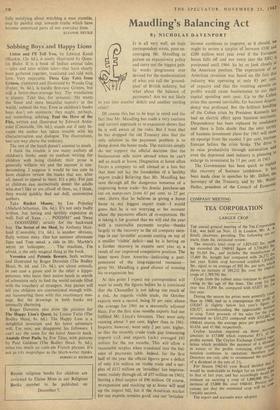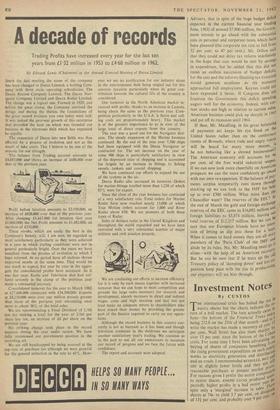Maudling's Balancing Act
By NICHOLAS
DAVENPORT Of course this has to be kept in mind and the fact that Mr. Maudling has made a very cautious and correct approach to re-expansion shows that he is well aware of the risks. But I trust that he has dropped the old Treasury idea that the only solution to the payments problem is to damp down the home trade. The statistics simply do not support the official doctrine that the businessman sells more abroad when he can't sell so much at home. (Stagnation at home often forces a company to sell abroad at a loss but that does not lay the foundation of a healthy export trade.) Believing that Mr. Maudling has seen through all the dangerous nonsense of a stagnating home trade—his drastic purchase-tax cut on motor-cars from 45 per cent, to 25 per cent. shows that he believes in giving a home boost to our biggest export trade—I would guess that he is not worrying at the moment about the payments effects of re-expansion. He is taking it for granted that we will end the year with a reasonable payments surplus—thanks largely to the recovery in the oil company earn- ings in our 'invisible' account coming on top of a smaller 'visible' deficit—and he is betting on a further recovery in exports next year as a result of our improved competitive position. The latest news from America—indicating a post- ponement of the long-expected recession— gives Mr. Maudling a good chance of winning his re-expansion bet.
At this point I expect my correspondent will want to study the figures before he is convinced that the Chancellor is not taking too much of a risk. As regards visible trade, the October exports were a record, being 10 per cent. above the average for 1961 on a seasonally adjusted basis. For the first nine months exports had not fulfilled Mr. Lloyd's forecasts. They were only running about 3 per cent, higher than in 1961. Imports, however, were only 2 per cent. higher, so that the monthly crude trade gap (measuring imports c.i.f. and exports f.o.b.) averaged £45 million for the ten months. This will allow a reasonable surplus when translated into the bal- ance of payments table. Indeed, for the first half of the year the official figures gave a deficit of only £16 million on visible trade and a sur- plus of £112 million on 'invisibles' (an improve- ment, mainly through oil, of £57 million on 1961), leaving a final surplus of £96 million. Of course, re-expansion and stocking up at home will send up the import bill, but if the American market for our exports remains good, and our 'invisible'
income continues to improve, as it should, we ought to secure a surplus of between £100 and £200 million next year even if the European boom falls off and our entry into the EEC is postponed until 1964. So let us look closely at the American position. The expectation of an American recession was based on the fact that industry was operating at only 83 per cent' ofcapacity and that the resulting squeeze on profits would cause businessmen to cut that capital spending next year. Up to the Cubaa crisis this seemed inevitable, for business desP011" dency was profound. But the brilliant handling of the Cuban crisis by President Kennedy bas had an electric effect upon business sentiment' Despondency has been replaced by confidence and there is little doubt that the next survey of business investment plans for 1963 will show an upsurge from the modest 3 per cent. increase forecast before the crisis broke. The chive IS to raise productivity through automation and even the depressed steel industry is planning to enlarge its investment by 13 per cent. in 1963. The Government has been quick to exploit this recovery of business confidence. It has been made clear in speeches by Mr. Dillon, the Secretary of the Treasury, and by Mr. Natter Heller, president of the Council of Economic Advisers, that in spite of the huge budget deficit expected in the current financial year (ending June, 1963) of around $7,800 million, the Govern- ment intends to go ahead with the substantial cuts in personal and corporate taxes which have been planned (the corporate tax rate to fall from 52 per cent. to 47 per cent.). Mr. Dillon said that they could not delay tax reform indefinitely in the hope that cuts would be met by savings in expenditure, but he added that this did net mean an endless succession of budget deficits, for the cuts and the reforms (limiting tax evasions) would generate surpluses as the economy approached full employment. Keynes could not have expressed it better. If Congress does not frustrate the Government this deficit spending augurs well for the economy. Indeed, with cur- rent stocks not high in relation to current sales, American business could pick up sharply in 1963 and put off its recession until 1964. If then, Mr. Maudling, in his great balancing of payments act keeps his eye fixed on the United States rather than on the conference rooms of Brussels, where rude and angry voices will be heard for many more moons, 1g he not behaving like a shrewd businessman? The American economy still accounts for per cent. of the free world industrial output. If we can now look more cheerfully on American prospects we can the more confidently go ahead with our own re-expansion. If the balance of pay- ments surplus temporarily runs down throng" stocking up we can look to the IMF for heir) up to over £500 million. What more does the Chancellor want? The reserves of the EEC? At the end of March the gold and foreign exchange reserves of the EEC came to $16,092 million and foreign liabilities to $3,874 million, leaving net total reserves of $12,217 million. But we can be sure that our European friends have no Wien tion of letting us dip into these for a 103.3. When it comes to hard money they are all strict members of the 'Paris Club' of the IMF arid t abide by its rules. No, Mr. Maudling must V alone—with the help of an American recovery ci But he can be sure that if he tears up the old Treasury policy of 'damping down' and leis. ex- pansion keep pace with the rise in produenv" our exporters will see him through.











































































 Previous page
Previous page